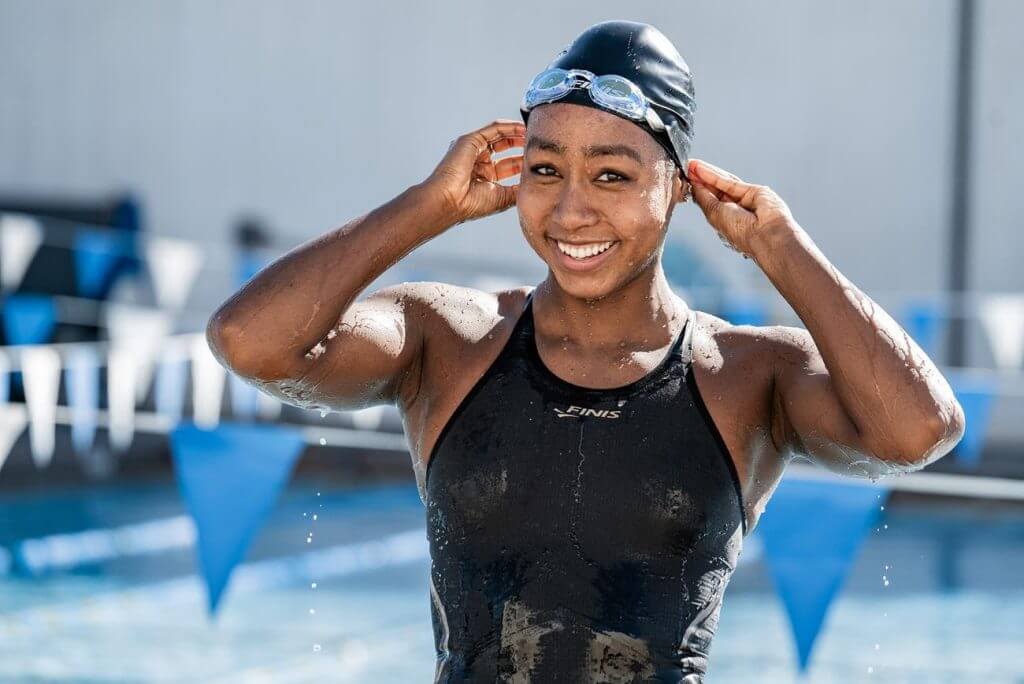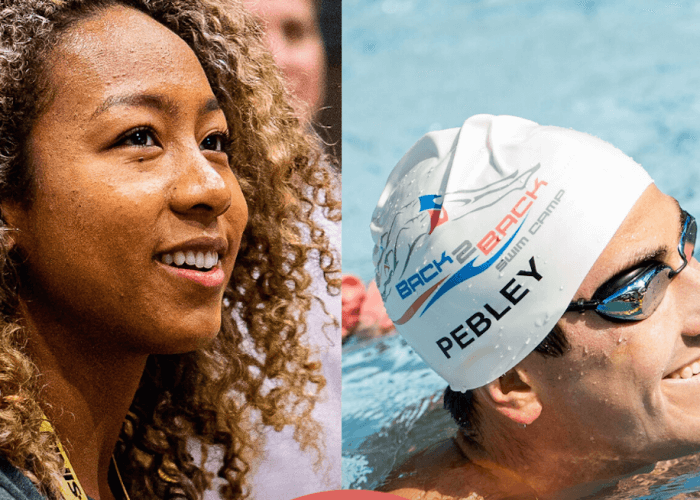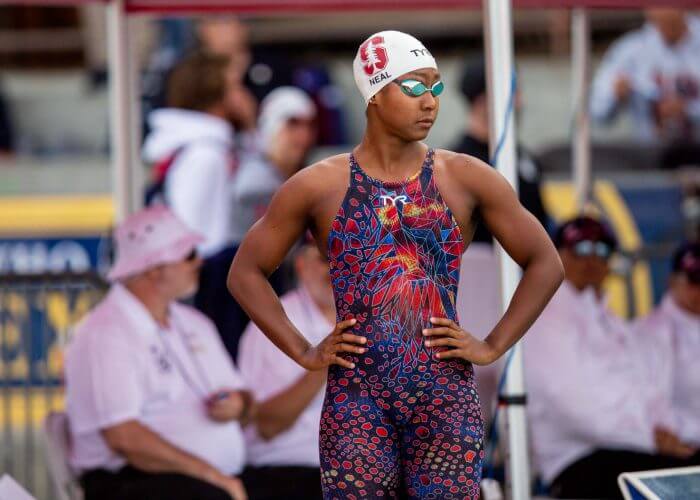Lia Neal, Jacob Pebley Create Platform for Change, Channeling ‘Pure Passion’

George Floyd was still alive when Lia Neal uploaded her first video to YouTube in early March. The project started on Jan. 20, the two-time Olympian using her cell phone and a bathroom mirror to record the intro, which would make its way onto the Internet some weeks later.
The inaugural upload, titled “Olympian becomes YouTuber,” was a way for Neal to document life in her mid-20s, in what was supposed to still be an Olympic year, to leave breadcrumbs she could follow years later. Through March and April, riding out COVID-19 quarantine in her native New York City, the videos contained standard YouTube fare: Skincare routines, hair care tips, a “chill day in Brooklyn.”
Like so much else in America, things changed drastically in late May, with a video Neal titled, “An Honest Conversation // What’s Going On, How to Cope, & What This Means for the Future.” Recorded in the wake of Floyd’s death at the hands of Minneapolis police and global demonstrations against systematic racism and police brutality, Neal saw two threads coming together. As a person of color – her mother is Chinese, her father is Black – she felt she needed to speak out amid turbulent times. Through her visibility as an elite swimmer and her growing comfort online, she had the platform to do it.
Those strands united in Swimmers for Change, which wrapped up its two-week run of video sessions Wednesday afternoon with a conversation between its founders, Neal and Jacob Pebley. The series, produced by CG Sports Management, has raised $15,000 through merchandise sales and donations for various socially-conscious charities. It has also sparked new and deeper conversations between swimmers on topics in and out of the pool.
“I think it was really important for us to show the rest of the swimming community and the world that there are swimmers that do deeply care about this and want to give back,” Neal said in Wednesday’s valedictory session. “Even in swimming, a predominantly white sport, we don’t stand for racism and we are here to show that we believe that Black lives matter. It’s easy to stay silent and we wanted to be able to provide that platform for swimmers, for these high-level, elite athletes that people look up to and know that they do want to help and want to be a part of that change.”

Lia Neal and Jacob Pebley Photo Courtesy: Swimmers for Change
Since their first session June 15 – a conversation about race and racing with sprinters Neal, Anthony Ervin and Cullen Jones – nearly 1,200 people have joined sessions featuring some 30 current and former swimmers. The Swimmers for Change Instagram account has just shy of 1,700 followers and will continue to raise funds through July.
Swimmers for Change has mostly been orchestrated by Neal and Pebley. After bringing the idea to CG Sports, they handled organizing the 12 programs, recruiting swimmers and selecting topics.
Separately, Neal has also maintained the YouTube channel, reached out to LeBron James’ production company Uninterrupted to collaborate on a “Dear America” video (with Cal swimmer Reece Whitley) to mark Juneteenth and, with Jones and other swimmers, consulted on USA Swimming’s amended response to the national protests on June 12.
The intent behind Swimmers for Change was to start a conversation and, in Pebley’s words, “grow a community.” Neal’s motivation stemmed from helping others not feel so alone in the emotions of the last month. Pebley started with the goal of hoping he could reach at least one person with something impactful on their lives, and he cited a number of lessons he learned in the process to inform his allyship. In addition to the 30 swimmers who took part in sessions, they heard from many more wanting to help going forward.
“We just wanted to help contribute in some way,” Neal said. “We are running off of pure passion and that passion carried us for two and a half weeks, and the last few days, I personally was feeling pretty burned out because we did everything so quickly. … We just had a vision, we knew what we wanted to do and used that to fuel us, and all of the other lessons, all of the other things that we learned fell in line with it.”
Though this portion of the Swimmers for Change series has ended, Neal and Pebley are looking for ways to keep the conversation going. While a daily series seems unsustainable, especially as Tokyo looms ever closer, they hope to tap into the community they’ve grown in other ways.
One of the most powerful sessions in the series was the first, featuring Jones, Neal and Ervin. It began as a conversation about race and covered serious ground about what it means to identify as Black in the overwhelmingly white world of swimming. It ended with three veterans talking shop, breaking down their passion and sharing stories of practices and races past.
The hour-long chat involved profound moments, like Jones discussing when he was pulled over by a police officer but let go once the officer saw his gear in the trunk and realized he was, “that black swimmer that went to the Olympics”. But it also involved joking about the last time they each swam longer than 100 yards in a race. (Spoiler: For one, it was last century.)
That conversation, proceeds of which benefitted the NAACP Legal Defense Fund, typified what Neal and Pebley sought to accomplish.

Lia Neal Photo Courtesy: Becca Wyant
“We all knew that diving into racism in America, it’s not easy. It’s work,” Ervin told Swimming World. “Even if you are black, trying to understand it and the work that goes into, it’s not easy and it’s painful. So we wanted it to be, as you make your way through it, there was a reward for it at the end. You wanted it to be edifying from a knowledge point of view, but we also wanted to make it what we’re passionate about, because that’s what allowed us to do the work in the first place. If we didn’t have the passion for swimming that we brought to it, we wouldn’t necessarily want to do this extra work. And it is extra work, if you’re a person of color in swimming. It has to be, that’s kind of the point of it. It is extra work. It’s not easy.
“We had never had these conversations with each other. We each have our own experiences with it, but we’ve never gotten together to talk about it and what that may be and how that might be applied. A lot of it was on us, making sure that we could step up and have those conversations about it. And we felt good about it. There’s a certain amount of vulnerability and catharsis with it. Even from what you saw in that video, us three, we grew from that.”
Neal reflected on that conversation Wednesday. She recalled talking to Ervin at a training camp ahead of the 2012 Olympics that, for the then-17-year-old, was one of the first times she had to confront being looked at as a swimmer of color.
That kind of dialogue – about what swimmers share and yet how unique their pathways are; about the heavy realities out of the water and the intricacies of perfecting your craft in the water – epitomizes the kind of thinking that Neal and Pebley sought to spark with Swimmers for Change.
“I think I learned a lot having that conversation with Cullen and Tony, because each person has a different background,” Neal said. “We all obviously look different, but we have this thing that connects us. So it was just cool to see and learn and hear about each of our experiences, just growing up, our life experiences, our experiences swimming. I think humans are just very cool creatures and everyone has a story, and I’m so glad we had this conversation, we have this platform to share our unique stories with the world, essentially.”




Brava, Lia! Swam with swimmers of color as a kid in Detroit, but others were discouraged by stereotyping of the sport. Come on, coaches, administrators, and swimming families, let’s work even harder on this .